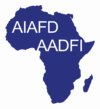
Macau SAR, China, October 27, 2025 – Over 170 thought leaders from Asia, the Pacific, and African development finance ecosystems gathered in Macau for the 2025 ADFIAP-AADFI Joint International CEO Forum held from October 22 to 24, 2025. Under the theme “Resilient Future: Harnessing Sustainable Finance for Development in Asia, Pacific, and Africa,” the three-day high-level event was attended by chief executives of development finance institutions (DFIs), policymakers, and private-sector innovators to explore bold strategies and actionable solutions to confront pressing challenges like climate change, financial inclusion, and sustainable development. The forum served as a catalyst for collaboration, shaping policy recommendations and generating innovative solutions to accelerate development finance contributions toward progress in Asia, the Pacific, and Africa, ultimately aiming for a resilient future.
The opening session set a strong tone for the discussions, with Dr. Patricia Ojangole, AADFI Chairperson and MD of the Uganda Development Bank (UDB), emphasizing the need for resilient and well-governed DFIs capable of mobilizing domestic resources, deploying them for good purposes, and reducing over-reliance on donor funding. She acknowledged that Africa has made fewer strides in development than Asia and urged African delegates to learn from Asia’s experience. Ambassador Extraordinary and Plenipotentiary of Benin to the People’s Republic of China, His Excellency Franck E. W. Adjagba, reinforced the importance of Asia-Africa collaboration, highlighting innovative financing tools such as green bonds and the transformative role of finance in promoting inclusive development. Dr. Kao Thach, ADFIAP Chairperson and CEO of the Agricultural and Rural Development Bank of Cambodia (ARDB), stressed the critical role of DFIs in climate-smart investments. He indicated that ADFIAP established Special Interest Groups (SIGs) to generate innovative ideas and solutions to common challenges faced by DFIs in the region and to strengthen regional cooperation.
The Forum featured two special-interest sessions and five thematic discussions covering sustainable finance, climate resilience, policy and regulatory frameworks, private sector engagement, and digital finance for development. These sessions showcased the collective commitment of development finance leaders to advancing inclusive, green, and resilient initiatives that can transform economies and communities in the regions.
The key takeaways:
- Sustainable finance is an urgent necessity for inclusive and sustainable development in the Asia-Pacific and Africa. Both regions face overlapping challenges – poverty, climate risks, and infrastructure gaps – making innovative, context-specific financing models essential for inclusive growth and development.
- Blended finance, guarantees, and other risk-sharing mechanisms are innovative tools for mobilizing private capital. They deliver impactful, scalable results in infrastructure and development projects by sharing risks and leveraging new financial approaches. Combining concessional public funds with private investment de-risks projects and attracts commercial investors, as demonstrated by successful models such as VEB.RF’s Project Finance Factory and other examples.
- Robust governance, transparency, and harmonized policies build investors’ confidence. Adopting credible impact measurement frameworks and harmonizing regulations are essential for scaling sustainable finance and attracting investment. Good governance and targeted policy frameworks unlock strong public-private partnerships.
- Innovative digital platforms and fintech solutions enhance financial inclusion. Investing in digital infrastructure, financial literacy, and localized solutions allows more people, especially marginalized groups and small institutions, to access financial services.
- Capacity building and knowledge sharing are vital for maximizing impact. Continuous training, technical support, and collaborative networks among DFIs, regulators, and private-sector actors help ensure the effective execution of sustainable finance initiatives.
- Clear taxonomies, mandatory ESG disclosures, and global coordination prevent greenwashing and regulatory arbitrage. Standardized frameworks and international cooperation ensure transparency, accountability, and alignment in sustainable finance practices.
- Research and data-driven methods strengthen policy and practice. The AADFI Economist Forum’s work supports comparative analysis and evidence-based research to guide decision-making and ongoing sector improvement.
- Regional DFI Associations must drive climate resilience. Organizations such as AADFI and ADFIAP must serve as regional hubs for green and climate-resilient initiatives, enabling DFIs to strengthen adaptation and mitigation efforts within their communities.










